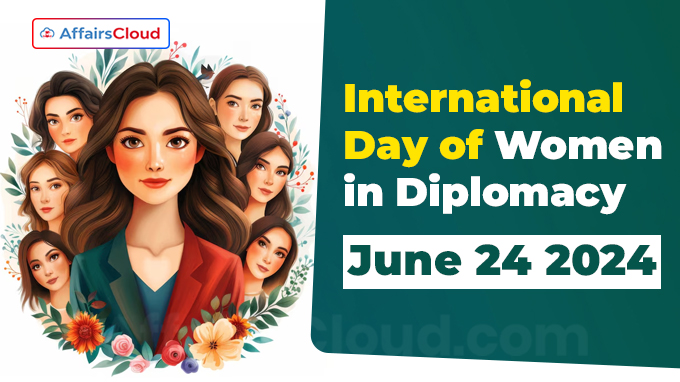 The United Nations (UN) International Day of Women in Diplomacy (IDWID) is annually observed across the globe on 24 June to acknowledge the crucial role of women diplomats in promoting socio-economic equitable and inclusive sustainable development.
The United Nations (UN) International Day of Women in Diplomacy (IDWID) is annually observed across the globe on 24 June to acknowledge the crucial role of women diplomats in promoting socio-economic equitable and inclusive sustainable development.
- IDWID also allows young people to engage with women diplomats as role models.
- 24 June 2024 marks the 2nd observance of IDWID.
The commemorative events of the 2024 IDWID focussed on the theme, “Women’s Leadership in Multilateral Diplomacy.”
Key Points:
i.Despite their undeniable contributions, women face significant barriers and inequalities in leadership and decision-making spaces, including diplomacy.
ii.Representation of women in key diplomatic roles, such as negotiators and mediators in peace processes, remains low.
iii.The 2024 observance addresses these challenges and emphasises the importance of women’s leadership in political decision-making processes.
Background:
i.On 20 June 2022, the UN General Assembly (UNGA) adopted the resolution A/RES/76/269, proclaiming 24 June of each year the International Day of Women in Diplomacy.
ii.The 1st ever International Day of Women in Diplomacy was observed on 24 June 2023.
2024 Commemorative Event:
On 24 June 2024, the 2nd annual commemorative event was organised to mark IDWID at the UN Headquarters in New York, United States of America (USA).
- The event aims to facilitate discussions on contributions, challenges, and opportunities for women in diplomacy.
Current State of Women’s Leadership:
i.According to the UN Women’s Global Data on Women Political Leaders 2024, women are significantly underrepresented in global executive positions, including Heads of State, Heads of Government, and Cabinet members.
- India(6.5%) ranked 171st in terms of representation of women in Parliament. Finland(63.2%) topped in the list, followed by Nicaragua(62.5%) and Liechtenstein(60%).
Top 5 Countries(as of January 2024):
| Rank | Country | Total Minister/Women | % Women |
|---|---|---|---|
| 1 | Finland | 19/12 | 63.2 |
| 2 | Nicaragua | 16/10 | 62.5 |
| 3 | Liechtenstein | 5/3 | 60.0 |
| 4 | Belgium | 14/8 | 57.1 |
| 5 | Andorra | 11/6 | 54.5 |
| 171 | India | 31/2 | 6.5 |
Highlights:
i.113 countries have never had a woman serve as Head of State or Government.
ii.Only 26 countries are currently led by women, a slight increase from 18 countries a decade ago.
iii.As of 1 January 2024, women hold just 23% of Ministerial positions globally, and in 141 countries, women comprise less than a third of Cabinet ministers.
iv.Women comprise 23.3% of Cabinet members in 2024, with a marginal increase of less than 0.5% from 2023.
v.They predominantly lead portfolios related to women and gender equality, family and children affairs, social affairs, and Indigenous and minority affairs.
vi.Key policy domains such as economic affairs, defence, justice, and home affairs remain largely male-dominated.
Note: 7 countries have no women in their Cabinets.
Diplomatic Representation:
i.Male dominance in diplomacy and foreign affairs extends to the Permanent Missions to the UN, where women remain underrepresented as Permanent Representatives.
ii.As of May 2024, 25% of Permanent Representatives to the UN in New York are women, 35% in Geneva (Switzerland), and 33.5% in Vienna (Austria).
Key Facts:
i.Women currently represent slightly over a third of the UN Security Council’s members, a figure significantly higher than the global average.
ii.As of 2014, 143 countries guaranteed equality between men and women in their constitutions, while 52 countries have yet to do so.
iii.Between 1992 and 2019, women accounted for 13% of negotiators, 6% of mediators, and 6% of signatories in peace processes worldwide.
Points to Note:
i.New Zealand was the 1st country in the world which ensured voting rights for women in 1893.
ii.Khertek Anchimaa Toka, who became of the head of State of defunct Tuvan’s Republic (erstwhile Soviet protectorate), currently part of Mongolia in 1940 until 1944, became the 1st elected woman head of state in the world.
UNGA President Dennis Francis Honours India’s Hansa Mehta on IDWID 2024
On 24 June 2024, at the Commemorative Event of IDWID 2024, UNGA President Dennis Francis honoured Hansa Jivraj Mehta, an Indian feminist leader, activist, and diplomat, who played a pivotal role in making the Universal Declaration of Human Rights (UDHR) more inclusive.
- She is credited for changing the phrase “All men are born free and equal” to “All human beings are born free and equal” in Article 1 of the UDHR.
About Hansa Mehta:
i.Born on 3 July 1897 in Surat, Gujarat, Mehta was an Indian scholar, educator, social reformer, and writer.
ii.She became the President of the All India Women’s Conference (AIWC) in 1946.
iii.During her presidency, she drafted the “Indian Women’s Charter of Rights and Duties“, which demanded gender equality and civil rights for women.
iv.She was the vice-chair of the UN UDHR Committee with Anna Eleanor Roosevelt of America.
- Anna Eleanor Roosevelt was the longest-serving First Lady throughout her husband President Franklin D. Roosevelt’s 4 terms in office (1933-1945).
v.She became the 1st female Vice-Chancellor in India with her appointment at SNDT University in Bombay (now, Mumbai, Maharashtra).
vi.She was one of the 15 women framers of the Indian Constitution.
vii.She was honoured with the Padma Bhushan in 1959 for Social Work. She passed away on 4th April 1995.
About UN Women:
It is the United Nations entity which works specifically for gender equality and the empowerment of women.
Executive Director- Sima Bahous
Headquarters- New York, the United States of America (USA)
Established- July, 2010




